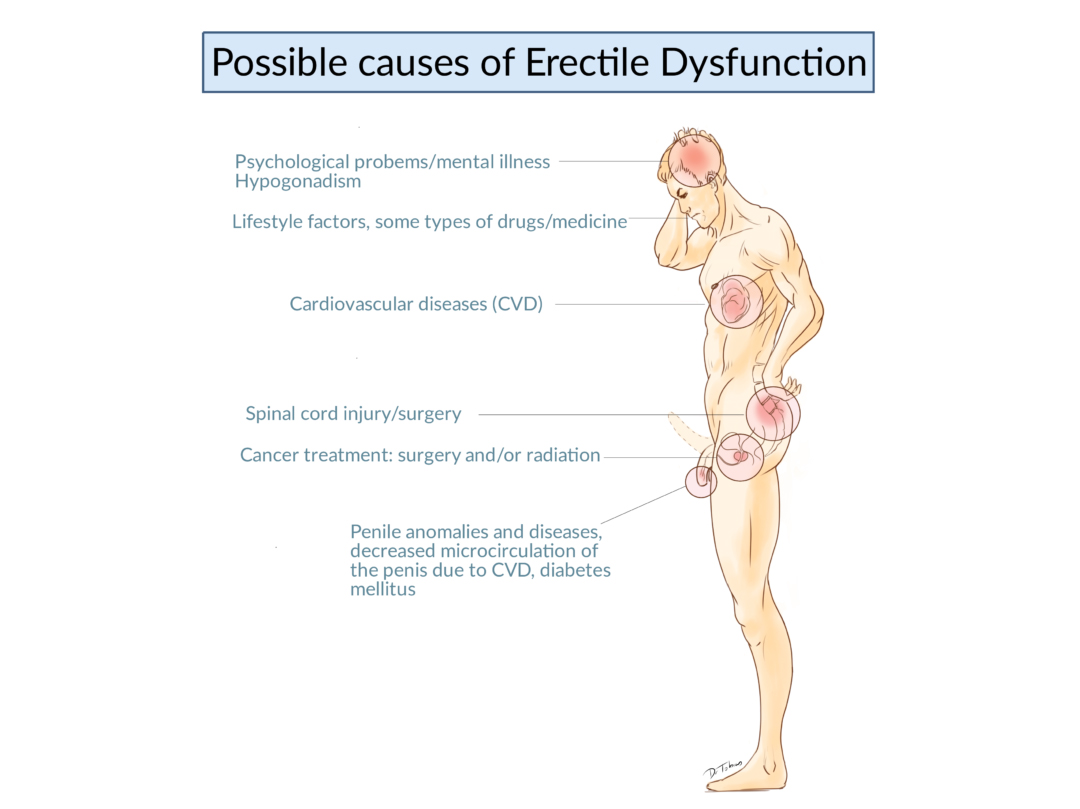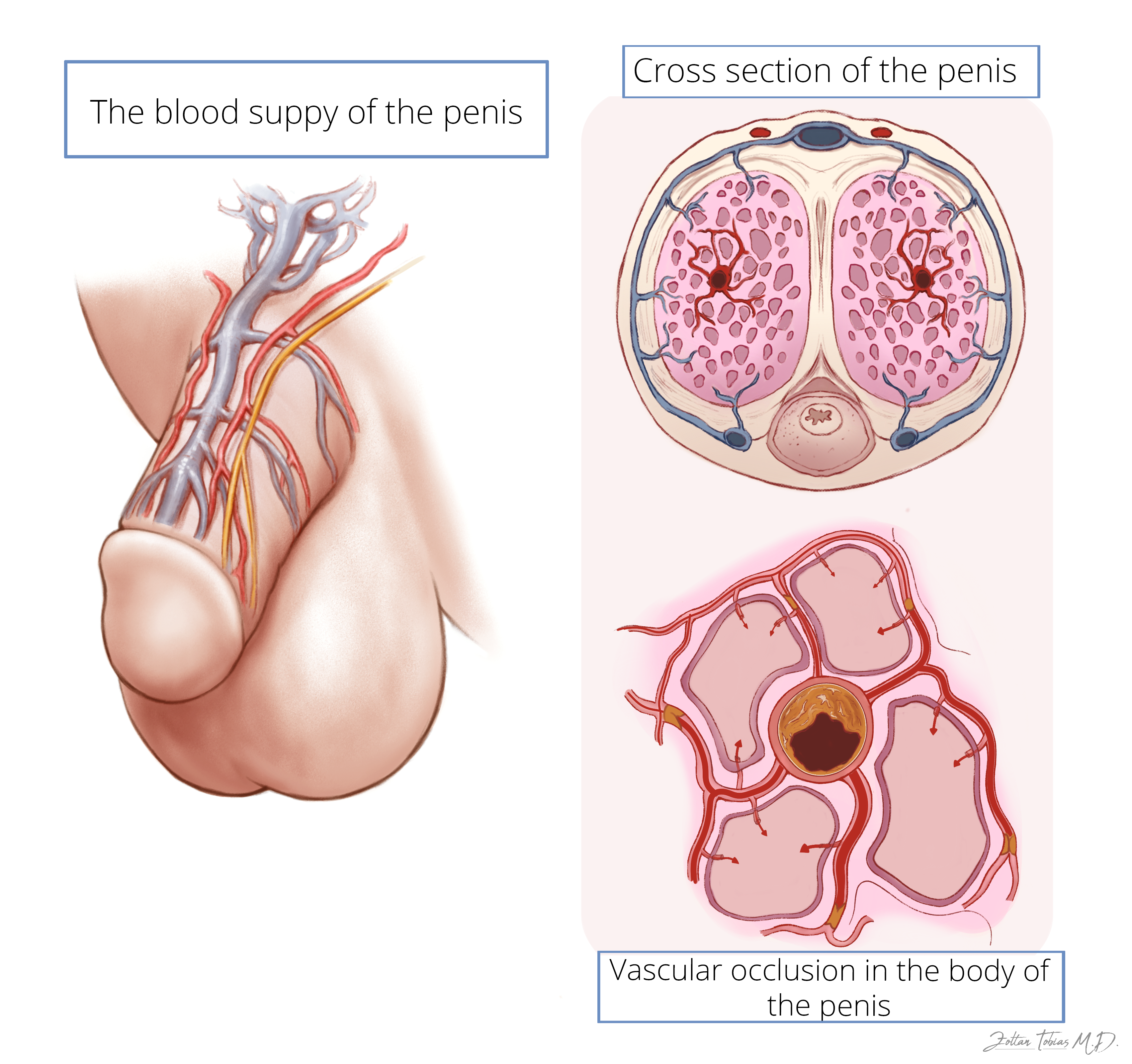What is erectile dysfunction?
Erectile dysfunction is defined as trouble getting and keeping an erection firm enough for sex.
Having problems getting an erection now and then is completely normal. However, if the inability is persistent and troublesome, it can be defined as erectile dysfunction.
How common is erectile dysfunction?
Erectile dysfunction is a very common sex problem and becomes increasingly common as men age. However, growing old does not always entail erectile dysfunction in men. Some men are sexually functional into their 80s.
What are the symptoms of erectile dysfunction?
Some men can get an erection but are unable to keep the erection long enough to have sex.
Some men can get an erection, but do not get the erection when he wants to have sex.
Some men cannot get an erection at all.
What are the causes of erectile dysfunction?

Erectile dysfunction can have many different causes. Since the body and the mind must collaborate for sexual function to work, problems both of physical and of psychological nature, or a combination of both, can give rise to erectile dysfunction.
Physical causes of erectile dysfunction include:
- Restricted blood flow to the penis. Erection is caused by blood trap in the penis. Underlying health issues like peripheral artery disease, atherosclerosis, heart disease, or diabetes can appear as erectile dysfunction because it limits the flow of blood to the penis. Sometimes erectile dysfunction is the first sign of such underlying disease.
- Inability to trap blood during an erection. This means that blood will flow to the penis and cause an erection. However, since the blood is not trapped in the penis, erection will fall again.
- Lack of nerve signals. Erection is dependent on nerve signalling from the brain and the spinal cord. If nerves are harmed due to disease, injury, or surgery in the pelvic region, this can manifest as erectile dysfunction.
- Some medicines can cause erectile dysfunction.
- Cancer treatment. Surgery and radiation in the pelvic region can affect the penis’ function. Examples are treatment of prostate, colorectal or bladder cancer.
Psychological causes of erectile dysfunction include:
- Anxiety
- Depression
- Conflicts in the relationship
- Stress, either at home or at work
- Stress from social, cultural, or religious conflicts
- Lack of self-confidence in terms of sexual performance
How is erectile dysfunction diagnosed?
The doctor will ask about your medical history, your general health, and the nature of your erectile dysfunction. He or she may also give you a physical exam and take a blood sample.
Details about your medical history and general health are important because factors like medicine, smoking and alcohol may all contribute to erectile dysfunction, as may a history of radiation therapy or surgery.
Information about your experience with sex and erectile dysfunction can help the doctor elucidate the origin of the problem, and whether the dysfunction is related to the desire for sex, or to erection function, ejaculation, and orgasm. Your doctor may also ask about your emotional health and your relationship with your partner, and whether you feel stressed.
The physical examination will include an exam of your penis and your testicles. Often, your blood pressure and pulse are measured, and in some cases a rectal exam is done to check your prostate.
The blood sample will be analysed for relevant hormones and, if relevant, factors related to cardiovascular health.
More advanced erectile function tests, like ultrasonography, scans, penile injection with a vascular stimulant or test of sleep erection overnight might be done in some cases.
How is erectile dysfunction treated?
Relevant treatment will depend completely on the underlying cause or causes of the problem.
Lifestyle changes
If your erectile dysfunction is caused by a lifestyle-related general health problem, including impaired cardiovascular health, your doctor can advise you to change your lifestyle. Changes can include:
- Better eating habits, like more plant-based food and less high-fat and processed food
- Maintain a healthy weight
- Quit smoking
- Increase exercise
- Limit the use of drugs and alcohol
- Get more sleep, preferably 7-8 hours per night
Psychological support
If your erectile dysfunction is caused by emotional problems, you can be offered psychological support, for example from a sexual health counsellor or a general health counsellor.
Medical treatment
While lifestyle changes and/or psychological support are often first choices, medical treatments are also available for erectile dysfunction. These include:
- PDE type-5 inhibitors which function by increasing penile blood flow. PDE type-5 inhibitors are pills that should be taken by mouth an hour or two before having sex.
- Alprostadil, which causes vasodilation and thereby increased penile blood flow. Alprostadil can be given by self-injection in the penis, via a pellet placed in the urethra or via a creme applied to the tip of the penis.
- In cases where low testosterone levels are detected, testosterone replacement therapy may improve the libido. In combination with PDE type-5 inhibitors, this can help some men getting an erection.
Mechanical device
Mechanical assistance can be provided in the form of a vacuum erection device. This is a plastic tube that slips over the penis, making a seal with the skin of the body. Pressure from a pump at the other end of the tube makes a low-pressure vacuum which results in an erection. An elastic ring is then slipped onto the base of the penis to trap the blood in the penis.
Penile implant
A penile implant, also called a penile prosthesis, is a surgical treatment. This may be a good solution for men, who have not had success with other treatments, or who have erectile dysfunction because the prostate has been removed by surgery due to prostate cancer. Penile implants can be semi-rigid or inflatable. Whereas they may help with erections, any cancer-treatment induced damage to sensation, orgasm or ejaculation will not be alleviated.





















